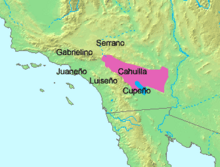Cahuilla language
| Ivilyuat | |
|---|---|
| Cahuilla | |
| ʔívil̃uʔat Ivil̃uɂat 'Ívillu'at Ivi'a |
|
| Pronunciation | [ʔivɪʎʊʔat] |
| Native to | United States |
| Region | Southern California |
| Ethnicity | 800 Cahuilla (2007) |
|
Native speakers
|
35 (2009) |
|
Uto-Aztecan
|
|
| Dialects | Desert Mountain Pass |
| Latin, NAPA | |
| Official status | |
|
Recognised minority
language in |
None
|
| Regulated by | None |
| Language codes | |
| ISO 639-3 | |
| Glottolog | cahu1264 |
 |
|
Ivilyuat /iviljˈuːæt/ (ʔívil̃uʔat or Ivil̃uɂat IPA: [ʔivɪʎʊʔat] or Cahuilla /kəˈwiːə/), is an endangered Uto-Aztecan language, spoken by the various tribes of the Cahuilla Nation, living in the Coachella Valley, San Gorgonio Pass and San Jacinto Mountains region of Southern California. Cahuilla call themselves ʔívil̃uqaletem or Iviatam–speakers of Ivilyuat (Ivi'a)–or táxliswet meaning "person." A 1990 census revealed 35 speakers in an ethnic population of 800. With such a decline, Ivilyuat is classified as "critically endangered" by the UNESCO Atlas of the World's Languages in Danger as most speakers are middle-aged or older with limited transmission rates to children.
Three dialects are known to exist: Desert, Mountain and Pass, as well as some other sub-dialects.
Cahuilla is found in the Uto-Aztecan language family where it is denoted alongside Cupeño to be a Cupan language within the larger Californian language subgroup where it joins Serrano, Kitanemuk, Luiseño and Tongva (Gabrielino). This Californian subgroup consisting of Cupan and Serran languages was once titled the Takic group which has fallen out of use.
...
Wikipedia
